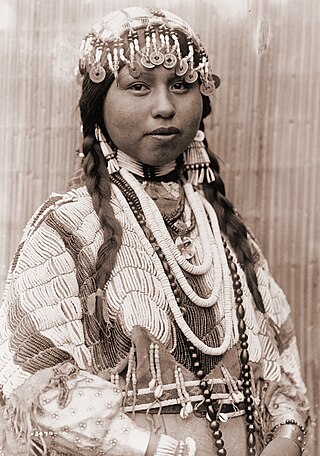Related Research Articles

Chinookan peoples include several groups of Indigenous people of the Pacific Northwest in the United States who speak the Chinookan languages. Since at least 4000 BCE Chinookan peoples have resided along the Lower and Middle Columbia River (Wimahl) from the river's gorge downstream (west) to the river's mouth, and along adjacent portions of the coasts, from Tillamook Head of present-day Oregon in the south, north to Willapa Bay in southwest Washington. In 1805 the Lewis and Clark Expedition encountered the Chinook Tribe on the lower Columbia.

The Siletz Reservation is a 5.852 sq mi (15.157 km²) Indian reservation in Lincoln County, Oregon, United States, owned by the Confederated Tribes of Siletz. The reservation is made up of numerous non-contiguous parcels of land in east-central Lincoln County, mostly east of the city of Siletz, between it and the Polk County line.

The Warm Springs Indian Reservation consists of 1,019 square miles (2,640 km2) in north-central Oregon, in the United States, and is governed by the Confederated Tribes of Warm Springs.
Warm Springs may refer to:

The Confederated Tribes of the Grand Ronde Community of Oregon (CTGR) is a federally recognized tribe of Indigenous peoples of the Northwest Plateau. They consist of 27 Native American tribes with long historical ties to present-day western Oregon between the western boundary of the Oregon Coast and the eastern boundary of the Cascade Range, and the northern boundary of southwestern Washington and the southern boundary of northern California.

Northern Paiute, endonym Numu, also known as Paviotso, is a Western Numic language of the Uto-Aztecan family, which according to Marianne Mithun had around 500 fluent speakers in 1994. It is closely related to the Mono language.

Kah-Nee-Ta Resort & Spa was a resort in central Oregon, United States, on the Warm Springs Indian Reservation, near the community of Warm Springs in Jefferson County. It closed on 5 September 2018, laying off all its employees. It is planned to reopen in the summer of 2023.

Wasco-Wishram are two closely related Chinook Indian tribes from the Columbia River in Oregon. Today the tribes are part of the Confederated Tribes of Warm Springs living in the Warm Springs Indian Reservation in Oregon and Confederated Tribes and Bands of the Yakama Nation living in the Yakama Indian Reservation in Washington.

The Confederated Tribes of Warm Springs is a recognized Native American tribe made of three tribes who put together a confederation. They live on and govern the Warm Springs Indian Reservation in the U.S. state of Oregon.
Upper Chinook, endonym Kiksht, also known as Columbia Chinook, and Wasco-Wishram after its last surviving dialect, is a recently extinct language of the US Pacific Northwest. It had 69 speakers in 1990, of whom 7 were monolingual: five Wasco and two Wishram. In 2001, there were five remaining speakers of Wasco.
Latgawa are Native American people who lived in the Rogue Valley of interior southwest Oregon. In their own language "Latgawa" /latʰka:wàʔ/ means "those living in the uplands," though they were also known as the Walumskni by the neighboring Klamath tribe.
In the first decade of the 2000s, the Confederated Tribes of Warm Springs sought to build a casino in the Columbia River Gorge. They ended their pursuit of the project in 2013. They considered various sites, as early as 1999; the most extensive plan called for a 60-acre (24 ha) facility with 250 hotel rooms in Cascade Locks, Oregon. The proposed site is within the Columbia River Gorge National Scenic Area, and adjacent to a federally designated wilderness area, but within the city limits of Cascade Locks..
The Oregon Superintendent of Indian Affairs was an official position of the U.S. state of Oregon, and previously of the Oregon Territory, that existed from 1848 to 1873.

The Tenino people, commonly known today as the Warm Springs bands, are several Sahaptin Native American subtribes which historically occupied territory located in the North-Central portion of the American state of Oregon. The Tenino people included four localized subtribes — the Tygh or "Upper Deschutes" divided in Tayxɫáma, Tiɫxniɫáma and Mliɫáma, the Wyam (Wayámɫáma) (Wayámpam) or "Lower Deschutes", also known as "Celilo Indians", the Dalles Tenino or "Tinainu (Tinaynuɫáma)", also known as "Tenino proper"; and the Dock-Spus (Tukspush) (Takspasɫáma) or "John Day."

The Burns Paiute Tribe of the Burns Paiute Indian Colony of Oregon is a federally recognized tribe of Northern Paiute Indians in Harney County, Oregon, United States.
Billy Chinook was a chief and member of the Wasco tribe. Chinook was a guide for John C. Frémont and Kit Carson, who explored Central Oregon from 1843 to 1844 and from 1845 to 1847. Chinook also served as First Sergeant, U.S. Army Wasco Scouts during the Snake War. Lake Billy Chinook in Oregon is named in his honor.
Simnasho is an unincorporated community in Wasco County, in the U.S. state of Oregon. It lies at the intersection of Simnasho Road, Wapanitia Road, and Simnasho–Hot Springs Road within the Warm Springs Indian Reservation. The name comes from a Sahaptin language word meaning black hawthorn bush.

The Walk of Flags, or Walk of the Flags, is located in Willson Park, on the Oregon State Capitol grounds, in Salem, Oregon, United States. It features the flags of the U.S. states, displayed in the order in which they were admitted to the Union.

William Cameron McKay (1824–1893) was a scout in the Snake War and Modoc War, a Captain in the U.S. Army, a member of the Warm Springs Scouts, and a physician and surgeon.
References
- ↑ Ramsey, Jarold (January 17, 2017). "George W. Aguilar, Sr. (1930– )". The Oregon Encyclopedia . Archived from the original on June 20, 2017. Retrieved June 6, 2017.